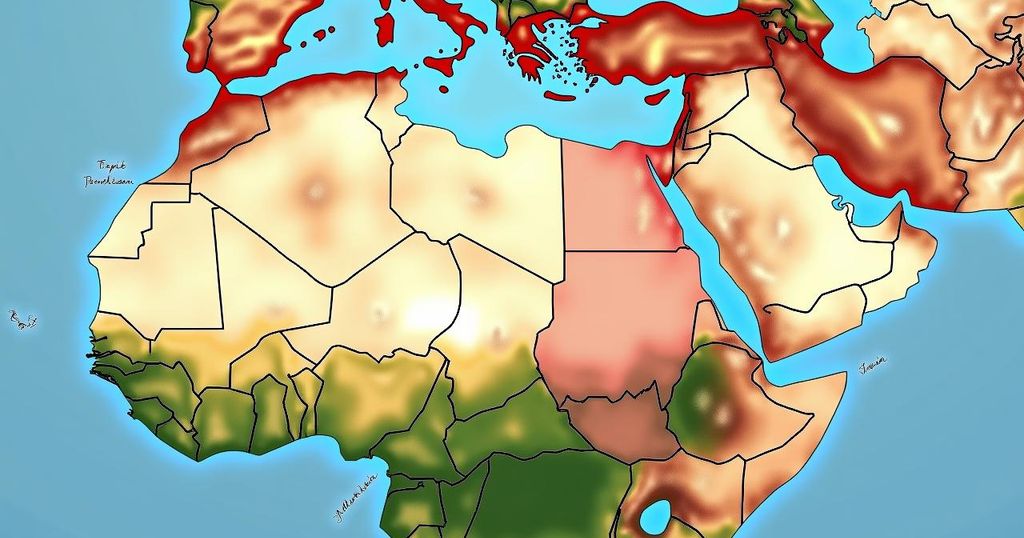Egypt is strengthening its foothold in the Horn of Africa by forming alliances with Somalia and Eritrea, primarily as a countermeasure against Ethiopia. A recent summit in Asmara highlighted these efforts, coinciding with accusations of Egyptian military involvement in the ongoing conflict in Sudan. Ethiopian leaders have voiced strong opposition to Egypt’s regional activities.
Egypt is augmenting its influence in the Horn of Africa through strategic alliances with Somalia and Eritrea. President Abdel Fattah Al-Sisi recently attended a tripartite summit hosted in Asmara alongside Eritrean President Isaias Afwerki and Somali President Hassan Sheikh Mohamud. This partnership serves to enhance their collective impact in the region and is perceived as a reaction against Ethiopia’s growing influence. The timing of the summit is noteworthy, occurring shortly after accusations from Mohamed Hamdan Dagalo, commander of the Rapid Support Forces, who claimed that Egypt had conducted air strikes against his units in Sudan. This suggests a pivot in Egypt’s approach during the ongoing conflict in Sudan, as it seeks to assert itself as a significant regional actor and safeguard its national interests. Despite the Eritrean government’s framing of the summit as a meeting to strengthen trilateral relations and address regional security concerns, analysts suggest that its primary aim is to form a cohesive front against Ethiopia. This has been fueled by Ethiopia’s recent memorandum with the Somaliland region, essentially granting it access to a port and naval base in the southern Red Sea, a strategic acquisition that Egypt views with alarm. The Egyptian presidential office asserted that the summit aimed to explore mechanisms to bolster bilateral relations and support developmental endeavors that benefit the region’s populace. In response to these events, Ethiopian Prime Minister Abiy Ahmed has expressed grave concerns regarding Egypt’s increasing involvement and has warned that Ethiopia will not tolerate any threats to its sovereignty. He declared, “We will not allow them to harm us, we will humiliate anyone who dares to threaten us to deter them.” Furthermore, Egypt is navigating the complexities of the Sudanese crisis as it backs army leader Abdel Fattah al-Burhan while simultaneously participating in diplomatic initiatives for conflict resolution. Despite facing allegations from the Rapid Support Forces about utilizing US-supplied weaponry in their operations, Cairo has professed its commitment to stabilizing Sudan and maintaining its state institutions. Egypt’s former deputy foreign minister, Ambassador Hussein Haridi, stated, “Egypt has been working since the first day of the war in Sudan to end it.” In contrast, Sudanese political analyst Mohamed Torshin highlighted Egypt’s opposition to any armed groups operating outside governmental frameworks due to the potential repercussions on its national security.
Egypt’s strategic interests in the Horn of Africa are deeply intertwined with its historical role as a regional power. The geopolitical landscape is complicated by the ongoing conflict in Sudan, where various factions vie for control, and by Ethiopia’s expanding influence, particularly after agreements with regional entities that could alter the balance of power. The tripartite alliance consisting of Egypt, Somalia, and Eritrea is viewed as a counterweight to Ethiopia, which has been actively gaining footholds in the region. Egypt’s historical reliance on the Nile River and its associated upstream nations also informs its calculated diplomatic maneuvers, as it strives to maintain its influence and safeguard its interests against perceived encroachments.
In conclusion, Egypt is actively reinforcing its position in the Horn of Africa through a strategic alliance with Somalia and Eritrea, particularly in response to Ethiopia’s expanding regional influence. The recent summit underscored Egypt’s intent to navigate complicated security dynamics in the region while preserving its national interests in the face of growing competition. Tensions related to military engagements in Sudan further highlight the complexities of Egypt’s involvement, as it seeks to balance regional relations while addressing its domestic security concerns.
Original Source: www.atalayar.com






